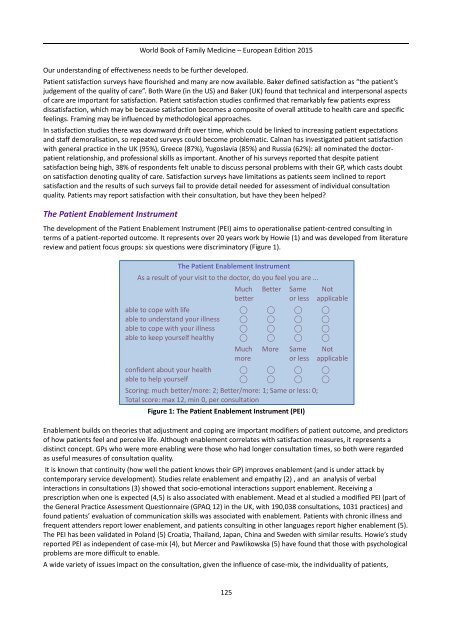Family Medicine
U8UQp
U8UQp
Create successful ePaper yourself
Turn your PDF publications into a flip-book with our unique Google optimized e-Paper software.
World Book of <strong>Family</strong> <strong>Medicine</strong> – European Edition 2015<br />
Our understanding of effectiveness needs to be further developed.<br />
Patient satisfaction surveys have flourished and many are now available. Baker defined satisfaction as “the patient’s<br />
judgement of the quality of care”. Both Ware (in the US) and Baker (UK) found that technical and interpersonal aspects<br />
of care are important for satisfaction. Patient satisfaction studies confirmed that remarkably few patients express<br />
dissatisfaction, which may be because satisfaction becomes a composite of overall attitude to health care and specific<br />
feelings. Framing may be influenced by methodological approaches.<br />
In satisfaction studies there was downward drift over time, which could be linked to increasing patient expectations<br />
and staff demoralisation, so repeated surveys could become problematic. Calnan has investigated patient satisfaction<br />
with general practice in the UK (95%), Greece (87%), Yugoslavia (85%) and Russia (62%): all nominated the doctorpatient<br />
relationship, and professional skills as important. Another of his surveys reported that despite patient<br />
satisfaction being high, 38% of respondents felt unable to discuss personal problems with their GP, which casts doubt<br />
on satisfaction denoting quality of care. Satisfaction surveys have limitations as patients seem inclined to report<br />
satisfaction and the results of such surveys fail to provide detail needed for assessment of individual consultation<br />
quality. Patients may report satisfaction with their consultation, but have they been helped?<br />
The Patient Enablement Instrument<br />
The development of the Patient Enablement Instrument (PEI) aims to operationalise patient-centred consulting in<br />
terms of a patient-reported outcome. It represents over 20 years work by Howie (1) and was developed from literature<br />
review and patient focus groups: six questions were discriminatory (Figure 1).<br />
The Patient Enablement Instrument<br />
As a result of your visit to the doctor, do you feel you are ...<br />
Much Better Same Not<br />
better or less applicable<br />
able to cope with life ⃝ ⃝ ⃝ ⃝<br />
able to understand your illness ⃝ ⃝ ⃝ ⃝<br />
able to cope with your illness ⃝ ⃝ ⃝ ⃝<br />
able to keep yourself healthy ⃝ ⃝ ⃝ ⃝<br />
Much More Same Not<br />
more or less applicable<br />
confident about your health ⃝ ⃝ ⃝ ⃝<br />
able to help yourself ⃝ ⃝ ⃝ ⃝<br />
Scoring: much better/more: 2; Better/more: 1; Same or less: 0;<br />
Total score: max 12, min 0, per consultation<br />
Figure 1: The Patient Enablement Instrument (PEI)<br />
Enablement builds on theories that adjustment and coping are important modifiers of patient outcome, and predictors<br />
of how patients feel and perceive life. Although enablement correlates with satisfaction measures, it represents a<br />
distinct concept. GPs who were more enabling were those who had longer consultation times, so both were regarded<br />
as useful measures of consultation quality.<br />
It is known that continuity (how well the patient knows their GP) improves enablement (and is under attack by<br />
contemporary service development). Studies relate enablement and empathy (2) , and an analysis of verbal<br />
interactions in consultations (3) showed that socio-emotional interactions support enablement. Receiving a<br />
prescription when one is expected (4,5) is also associated with enablement. Mead et al studied a modified PEI (part of<br />
the General Practice Assessment Questionnaire (GPAQ 12) in the UK, with 190,038 consultations, 1031 practices) and<br />
found patients’ evaluation of communication skills was associated with enablement. Patients with chronic illness and<br />
frequent attenders report lower enablement, and patients consulting in other languages report higher enablement (5).<br />
The PEI has been validated in Poland (5) Croatia, Thailand, Japan, China and Sweden with similar results. Howie’s study<br />
reported PEI as independent of case-mix (4), but Mercer and Pawlikowska (5) have found that those with psychological<br />
problems are more difficult to enable.<br />
A wide variety of issues impact on the consultation, given the influence of case-mix, the individuality of patients,<br />
125



